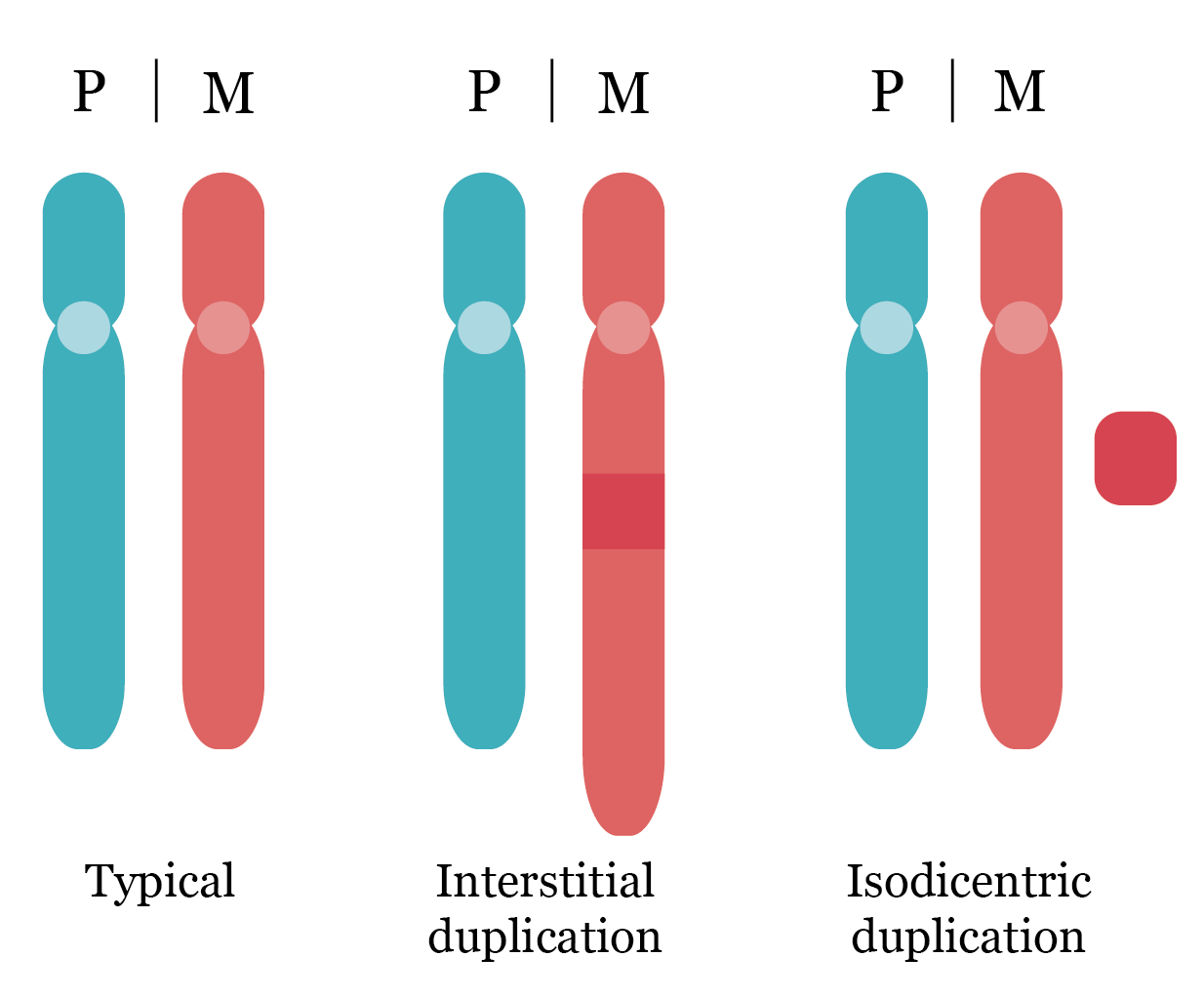What is Dup15q Syndrome?
The Dup15q Syndrome is a rare genetic disorder, which is accompanied by development delay, epilepsy, motor problems, behavior and sleeping problems. The symptoms can vary in severity with mild to severe developmental delay.
What Causes Dup15q Syndrome?
The Dup15q Syndrome is caused by an extra piece of chromosome 15 (a "duplication" in the 15q11.2-q13 region). This often concerns the chromosome that is inherited from the mother. This extra piece can be present in the chromosome itself ("interstitial duplication") or form an independent small chromosome ("an isodicentric duplication"; in the Netherlands also called IDIC-15 or marker chromosome 15). The size and location of the extra piece probably also determines the variation in clinical signs. The UBE3A gene is almost always located on this extra piece of chromosome. This gene is important for brain development and function. Loss of this gene causes Angelman Syndrome.

How common is Dup15q Syndrome?
The Dup15q Syndrome is quite rare and is estimated to affect one in 10,000 people.
Examination and diagnosis
Children diagnosed with Dup15q can be referred to the ENCORE Dup15q Expertise Center by their GP or practitioner. The children are seen and examined at this clinic every year. We structurally evaluate the development in the field of learning, movement and communication, epilepsy, sleeping, eating and growth and other frequently occurring complaints. The children keep their pediatrician and neurologist in their own region. Our goal is to further optimize healthcare through our specific experience.
The Dup15q consultation hour
The Dup15q clinic is 4x / year on Wednesday. The parents and the child always see the pediatrician, pediatric neurologist and the remedial educationalist and we hope to add a nurse specialist to our team soon. The clinical geneticist is also present at the first visit. In addition, the child is seen at fixed times by the speech therapist, the physiotherapist and the child psychiatrist. On indication, we also engage the dietician, ophthalmologist and / or orthopedist. From the age of 18, the patients are seen by the physician for intellectual disabilities (AVG), the remedial educationalist and the rehabilitation doctor.
Treatment has been symptomatic so far. Epilepsy is treated with drugs and sometimes a special diet. Development, sleeping and behavior are supported with therapy by the physiotherapist, speech therapist, remedial educationalist. The parents receive a lot of advice on what to practice with their child at home. Sometimes drugs are needed for concentration or behavior.
Child care
Pediatrician-EAA and coordinator: Drs. Karen Bindels-de Heus
Pediatric neurologist and coordinator: Dr. Marie-Claire de Wit
Child behavioral therapist: Dr. Maartje ten Hooven-Radstaake
Speech therapist: Cindy Navis
Physical therapist: Lina van Dongen
Child psychiatrist: Dr. Leontine ten Hoopen
Psychologist: Dr. André Rietman, Dr. Sabine Mous
Clinical Geneticist: Dr. Alice Brooks
Adult care
GDPR: Dr. Marlies Valstar (affiliated with ASVZ)
Rehabilitation Doctor: Dr. Sandra Titulaer
Child behavioral therapist: Dr. Maartje ten Hooven-Radstaake
Click here to go to the contact form or mail yourself to: Dup15q@erasmusmc.nl
In order to provide the best possible care to patients with a rare condition, it is essential that global knowledge about the condition is gathered. Nationwide, centers of expertise have been set up to stimulate care for rare disorders and to gather knowledge. For the formal recognition of an expertise center by the Ministry of Health, an important condition is that the expertise center gathers, analyzes and shares knowledge through publications. These can be publications in scientific journals, but also treatment guidelines for health care professionals or information brochures for patients or caregivers. We optimize care and research within ENCORE through standardized follow-up and close collaboration between doctors and researchers. That way, we can ultimately develop better treatments for rare conditions. You may therefore be asked to participate in research. Participation in research is always on a voluntary basis. The data obtained is stored and analyzed in an anonymous form. All research has been approved in advance by an ethics review committee.
To learn more about research into Dup15q Syndrome at ENCORE, click here
In the Netherlands there is not yet a patient organization for people with the Dup15q Syndrome, but a number of parents have already made contact with each other. There is an active parent organization in America, click here to go to the website.
On Wednesday 11th of September 2024 the team of the Dup15q ENCORE expertise center organizes an information evening for parents of children with Dup15q syndrome at the Erasmus MC. From 17:30 to 20:30 clinical and scientific topics will be discussed. For more information or to register you can send an email to dup15q@erasmusmc.nl.
